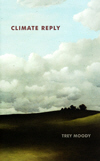Climate Reply
Trey Moody opens his chapbook Climate Reply with a quote from Francis Ponge’s “The Crate” (translated by Margaret Guiton): “Halfway between cage (cage) and cachot (prison cell) the French language has cageot, a simple openwork container for transporting fruits that sicken at the least hint of suffocation.” This idea of something in between, the slight removal or separation—but also the space for breath—pervades the poems that follow, as do the ideas of sickening and suffocation, in this collection that feels markedly Mid-Western, with its open land, its expansive and threatening skies, and its inability to shake its ghosts.
Trey Moody opens his chapbook Climate Reply with a quote from Francis Ponge’s “The Crate” (translated by Margaret Guiton): “Halfway between cage (cage) and cachot (prison cell) the French language has cageot, a simple openwork container for transporting fruits that sicken at the least hint of suffocation.” This idea of something in between, the slight removal or separation—but also the space for breath—pervades the poems that follow, as do the ideas of sickening and suffocation, in this collection that feels markedly Mid-Western, with its open land, its expansive and threatening skies, and its inability to shake its ghosts.
Each poem in this collection is tightly controlled, each word full of purpose. These well-crafted poems make effective use of strange and delicate imagery, as seen in the opening of the first poem “What We First Said”: “The tiniest oak tree / in the tiniest room— / as we feel our eyes, our greedy joints / unhinge and root.” Throughout the collection the familiar becomes unfamiliar and a certain derangement of the senses occurs as we think of eyes unhinging or a boy waking up at night “to smell his room singing / in a familiar voice” (from “The Book of Flattened Hands”). “This Forest Isn’t a Room” also makes the familiar strange:
You cannot remember what your body does
but you believe your body’s not a tree, a tree not a body.
Shake with cold like you shake with cold.
The trees,
they shake their leaves like walls in the wind.
There is a strong sense of foreboding in these poems. In “The Book of Flattened Hands,” we’re told of a story where “something violent / happens to a lamb” and after a number of years “the house swallowed the house / and digested each and every lamp within it.” The same poem instructs, “listen to the size of your existence,” which gets at human insignificance in relation to nature or the world at large. Later we’re told, “The landscape’s there to remind us / of our failures,” and elsewhere in this short collection the sky is “a soundless face” and listening pleases “the violence of our ears.”
Throughout the collection, the language is direct; there is a straight forward matter-of-factness to the poems. The speaker seems to be weighed down by the burden of generations and is someone who is haunted by the past, someone who feels the past as a strong presence in his present life. The longest poem in this chapbook is made up of ten numbered sections, with parts one through four appearing early on, parts five through seven toward the middle, and the final parts, eight through ten, appearing toward the end. Titled “Dear Ghosts,” the poem addresses these various presences. In this poem too, we see the liminal—the ambiguous space between, sometimes literal as in a window fogged by breath, to which the speaker says, “If I was outside, / I’d read your backward name again and again.” The sections of “Dear Ghosts” illustrate various encounters with seemingly otherworldly presences. Moody writes, “Add this / to the list. When I open the fridge // in the middle of the night, I can hear / you thinking behind me.”
Occasionally the separation that occurs leads to confusion and misunderstanding as in the poem “A Feather Protruding From the Mouth,” where the separation of windows, heavy curtains, and walls creates ambiguity:
Through the wall, our “hand” might’ve been “land,”
“sand,” or “band.” But it was all of these.
At the same moment you sneezed, a bird,
or something else with feathers, flew into the window.
Of course we didn’t see it,
so our “flew” could’ve been “blue,” “glue,” or “God.”
One of the standout poems in the collection is the title poem, which uses sound, rhyme, and repetition in a way that the other poems don’t. Its repetition of the word “weather” also leads to misreadings of “whether”: “Weather as if to repeat. Weather to read a name. / As if to ask a question, weather to strip the mane, // to feed the cats, to sleep. Go inside, weather to weep.”
Climate Reply makes for a quick read, but these are poems that are definitely worth revisiting to familiarize yourself with their strangeness, to slip fully into their world.





